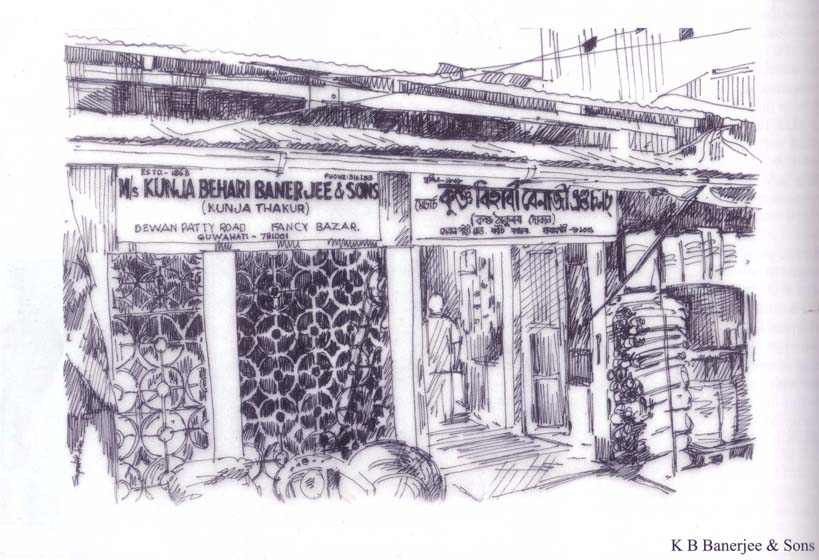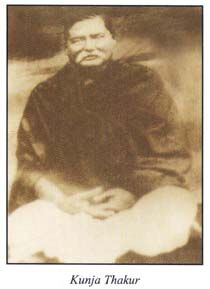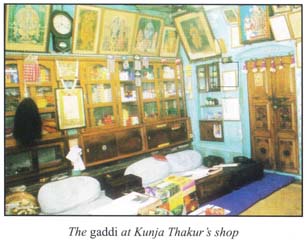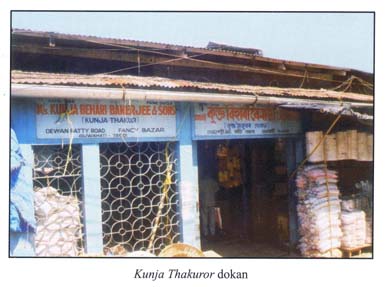| PLACE FOR PROVISIONS |
 |
Kunja Thakur is a household name in Guwahati. Hailing from an ordinary family in Madhyapara village of Vikrampur, Dhaka (now in Bangladesh), Kunja Behari Banerjee, popularly known as Kunja Thakur, was during his lifetime an institution by himself. By sheer dint of hard work, trade acumen and vision, Banerjee built a business empire that spread over many places of lower Assam. Located in the heart of Fancy Bazar, K B Banerjee & Sons, commonly referred to as Kunja Thakuror dokan, has since the early 19th century been a hub of business.
|
Kunja Behari Banerjee came to Assam sometime in the early 1870s in search of his maternal uncle Aditya Chatterjee, who was then managing a small grocery shop near the Fancy Bazar riverside. Soon after Chatterjee met his young nephew he insisted that Kunja look after the shop while he made a short visit to his home in Dhaka. Kunja agreed, never imagining for a moment that his stay would be longer than a few months. But years passed and his uncle did not return. Kunja then decided to abandon the business and go back in the “abode of Goddess Kamakhya”. Young Kunja who had by then gained in experience decided to listen to Sen, though he did not have the faintest clue that fortune was smiling on him. Kunja now took the business seriously. By the end of the 1880s he expanded the grocery business and elevated the shop to the most exclusive retail shop in town. |
 |
From ingredients for ayurvedic medicine like boira, silikha, amlakhi and hony, puja materials from camphor to almanac to grocery items like cumin and custard - everything was available at Kunja Thakur’s shop.
With extraordinary vision he developed the business beyond grocery. When the Collector of Guwahati issued trade license for opium for lower Assam (free trade of opium was prohibited by British government), Kunja Thakur put his bid and succeeded n getting permit for its retail distribution. That really turned the wheel of fortune towards him. He became the goladar (stockist) of opium and within a short time established a chain of about 32 shops (mainly retail outlets of opium) in different parts of lower Assam.
While common men, particularly villagers, were the main clients of opium, the Fancy Bazar shop attracted a fair share of the middle class and elite of society. Kunja Thakur also became the supplier of foodgrains to the Assam Bengal Railways and Trading Company workers when the company was installing railway lines in different parts of Assam.
 |
Kunja Thakur dokan even today is synonymous with good quality. Until a decade ago a red khata (notebook) was maintained in the shop comprising at list of regular clients who paid for goods bought on a monthly basis. Among them were Gopinath Bardoloi, Tarun Ram Phookun, Kalicharan Sen, Nao Gosain Kumudeswar Goswami, Guru Prasad Baruah and many others. Kunja Thakur was married twice, and sired three sons - Kedareshwar, Bhubaneshwar and Bireshwar - and a daughter. During his lifetime he amassed a huge fortune and hundreds of acres of land. But at the same time, Kunja Thakur was also a philanthropist. The crematorium (smasan) at Bhutnath was established on land donated by him. |
He also made generous donations towards the establishment of Gauhati Harisabha, Kamrup Academy, Bengali School, Fancy Bazar Puja samiti and many other institutions.
Interestingly, though Kunja could neither speak nor understand English, he maintained friendly relations with many of the British officers in the town. The lingua franca was Hindi. Kunja Thakur’s name is mentioned in the personal diary of A H W Bentinck, erstwhile Deputy Commissioner of Kamrup who frequently visited his shop.
|
There was a time when Kunja Thakur commanded so much respect that when his phaeton enter Fancy Bazar street vendors stood up in reverence. Later, towards the end of his life, he traveled in a Morris *car bearing registration number ASK 129. This enterprising businessman also had a utensil shop at Maulavibazar in Dhaka. In March 1914 at the age of 75 he went to Dhaka for a visit where he passed away. But his legacy still remains in the town. K B Banerjee & Sons has survived three major earthquakes and two major fires, and continues to stock all kinds of provisions. And even now, the shop’s sales are entered in its red book of accounts under the heads baje, kirana and abgari. The only thing missing in the shop today is ganja or afim (opium). |
 |